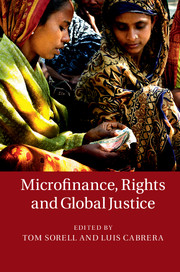Microfinance, Rights and Global Justice
Tom SORELL, Luis CABRERA
Availability: Out of stock - available in 10 open days
- Categories: External Relations
- Publisher: CAMBRIDGE UNIVERSITY PRESS
- ISBN: 9781107110977
- Publication Date: 08/01/2015
- Binding: Paperback
- Number of pages: 212
Summary
Microfinance - the practice of providing small loans to promote entrepreneurial activity among those with few financial assets - is increasingly seen as a sustainable means of aiding the global poor. Perhaps its most influential advocate, Nobel Laureate Muhammad Yunus, has claimed that there is a human right to microfinance, given its potential for poverty alleviation. This book directs critical philosophical attention at this very widely used and praised poverty-reducing measure. In chapters that discuss microfinance schemes and models around the world, internationally renowned contributors address important questions about both the positive impact of microfinance and cases of exploitation and repayment pressure. Exploring how far microfinance can or should be situated within broader concerns about justice, this volume sheds light on ethical issues that have so far received little systematic attention, and it advances discussion on new human rights, exploitation, and global justice.
Table of contents
Introduction Tom Sorell
1. Credit is not a right John Gershman and Jonathan Morduch
2. Is there a human right to microfinance? Tom Sorell
3. Financial inclusion, education, and human rights Kimberly Brownlee and Zofia Stemplowska
4. Microfinance, non-ideal theory, and global distributive justice Daniel Butt
5. Microfinance, poverty relief, and political justice Miriam Ronzoni and Laura Valentini
6. Is exploitation permissible in microcredit? Lesley Sherratt
7. What's wrong with exorbitant interest rates on microloans? Joakim Sandberg
8. Tensions between financial and organisational sustainability: the problematic case of group-based microfinance and possible ways forward Ana Marr
9. Freedom and credit Mark Hannam.
